Hey there, my lovely souls on the journey of inner peace! If you’ve ever felt like life is a non-stop whirlwind of to-dos and notifications, then welcome – you’re in the right place. Today we are jumping into the 9 best meditation tips for beginners.
This post includes affiliate links. As an Amazon Associate, I earn from qualifying purchases, at zero cost to you.
This post is for informational and educational purposes only. This post should not be taken as medical advice or used as a substitute for such. We do our best to present the best and most accurate information, however, we are not a licensed medical professional. All information on this Site is from personal experience or opinion, and we are not liable for risk and issues associated with using or acting upon the information on this Site. See Terms & Conditions for further information.
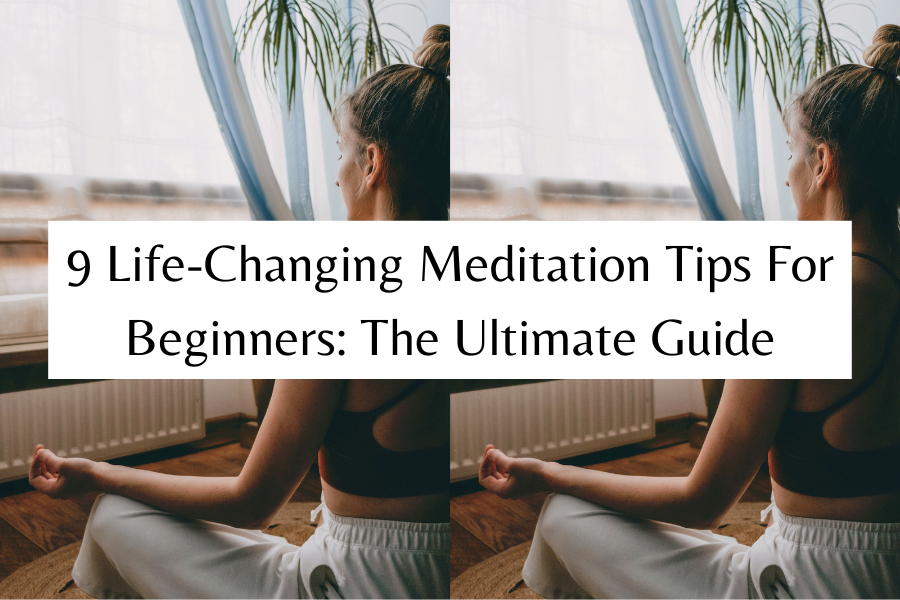
Meditation isn’t just for monks on mountaintops, and you don’t have to be a seasoned yogi to practice it. Meditation is a powerful tool for anyone seeking a bit more Zen in their day-to-day.
Whether you’re managing a hectic career, juggling household and family responsibilities, or simply craving a moment to breathe, meditation offers a sanctuary amongst the chaos.
Imagine it as a mini vacation for your mind.
Stress melts away and clarity emerges like a calming sunrise.
So, grab your yoga mat or find a cozy spot because we’re about to dive in so that you can make meditation a part of your balanced healthy lifestyle.
This post is all about the best meditation tips for beginners and how you can add them to your daily routine today.
Why Meditation is Good For You
If you’re here, it’s likely you already know practicing meditation can be extremely beneficial for you.
But…
In case you didn’t already know. IT IS!
Meditation isn’t just a trend that has been popping up on social media for the last couple of years. It’s been around a long, long… time.
Some of the first written descriptions of meditation were found in the ancient Indian Vedas around 1500 BCE.
But it’s believed that meditation was around way before that. However, there simply isn’t any written proof until 1500 BCE.
Now that we know roughly when it may have begun being a tool in human rituals let’s dive into the benefits.
First off, meditation can be your ticket to taming stress, anxiety, and even depression. Practicing meditation on a regular basis can help you navigate those hectic days with a calmer mind and light heart.
Secondly, it improves the immune system by decreasing inflammatory cytokines (proteins that can cause inflammation in the body).
Meditation also shows to be beneficial for people with diabetes and high blood pressure.
Not only does meditation have all these wonderful physical benefits for our body but it also acts as a mental gym, boosting your focus and concentration.
But it’s not just about productivity and improved health. It’s about getting in touch with your inner self, growing self-awareness and emotional intelligence.
Not to mention meditation can help promote deep relaxation, clearing the mind of busy chatter and aiding in better quality sleep.
I for one will do anything that helps me sleep better!
Meditation Tips For When You First Start
1. Finding A Quiet Space
In the craziness of our daily lives trying to prioritize our health and finding balance, creating a peaceful atmosphere is key for meditation. Creating a serene space in your home can make all the difference in building a solid meditation routine.
Find a spot away from the busy areas in your home. This could be by a window with a cozy cushion or soft blanket.
Try dimming the lights, grab a plush pillow or meditation cushion, and voila!
Your new “zen den” is ready for you to find bliss.
I have found that I also really love meditating outside. If you have somewhere that is peaceful and away from the noise of the busy world.
It could be a local park or simply anywhere that is a little secluded so it’s nice and quiet.
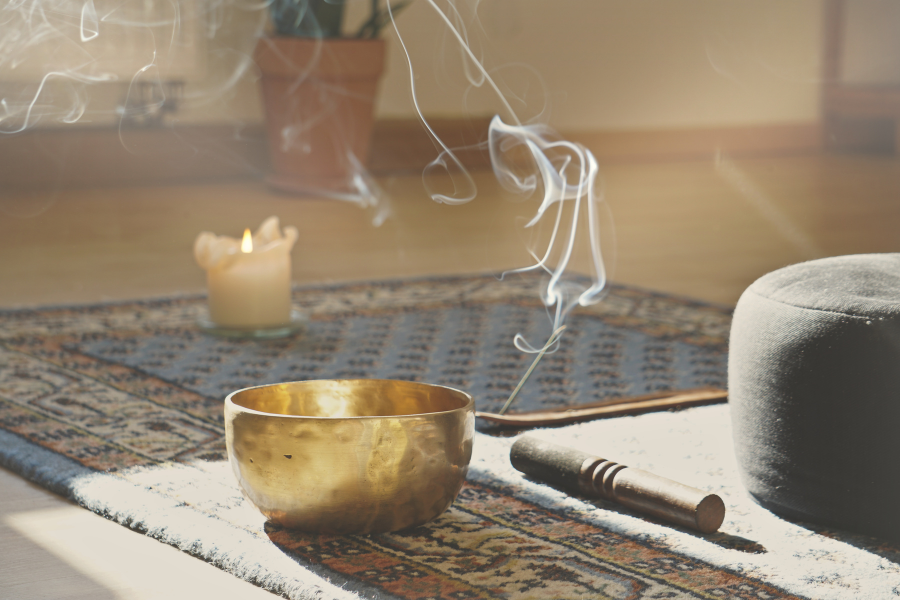
2. Play Calming Music
Music isn’t just for dancing, it is also one of the best meditation tips for beginners. It’s a magical mood setter that can transport you into another dimension.
Picture yourself melting into a soothing symphony of nature sounds or gentle instrumentals.
I love this YouTube soundtrack with its waterfall sounds and relaxing music, or these Tibetan healing sounds for getting rid of negative energy.
Both are very beautiful and peaceful in my opinion. I often switch up what I play in the background depending on how I’m feeling that day.
Having music on I find helps guide you into deeper relaxation. It’s like a personal soundtrack to serenity.
3. Light A Candle
There is just something about having a candle lit that immediately calms my mind and nerves. The flickering of the flame is something magical.
Lighting a candle sets the mood for relaxation, which is exactly our goal with these meditation tips for beginners.
If flames aren’t your thing though, you can opt for LED alternatives or you can even explore the world of essential oils for added ambiance.
4. Start Slow & Then Build Up
Remember ladies Rome wasn’t built in a day, and neither will your meditation practice.
These tips are here for you to build a sustainable mediation routine. Not overwhelming yourself in the beginning can motivate you to continue with it.
Begin with short sessions – think 5 to 10 minutes.
Allow yourself to ease into the experience.
As you feel more comfortable and are better able to focus longer you can gradually extend your meditation time.
But don’t worry, if you’ve moved up to 20-30 minute meditations and then all of a sudden one day you can’t focus for that long.
That’s totally fine!
You don’t always have to continue increasing time. Some days a shorter practice might be exactly what you need while other days you may feel the need to really dive in and explore longer.
Listen to your body.
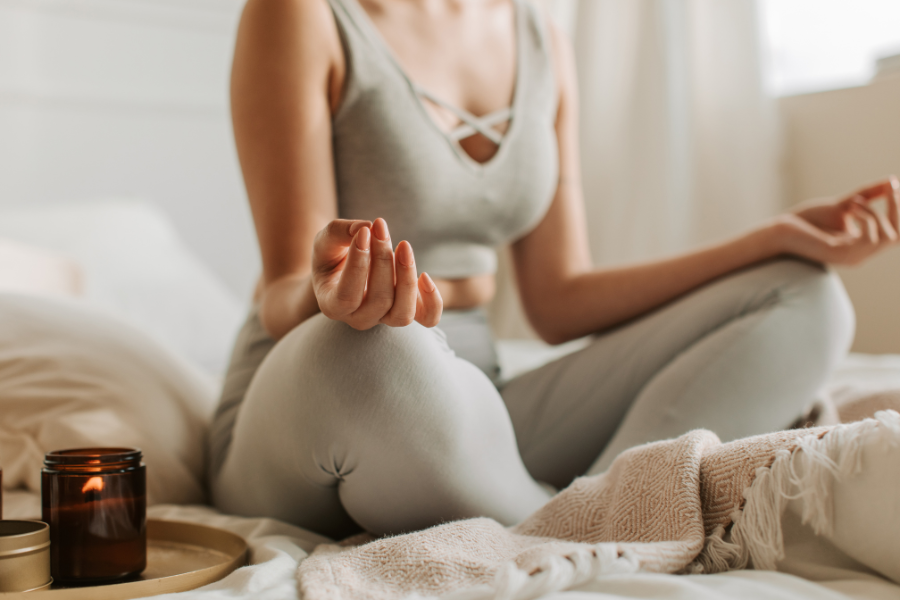
5. Focus On Breathing
The next of our meditation tips for beginners is to find what breathing technique you like best.
Sometimes once you find the time to sit down to meditate you find you’re not quite settled and might need a little help to relax.
Focusing on breathing is a great way to do that.
You can try deep breathing. This is where you take a deep breath in through your nose, hold for a few seconds, and then exhale through your mouth.
Being mindful to inhale and exhale slowly and controlled, and pausing in between breaths to help create space.
Repeat this until you feel a little more relaxed. You can then go back to your normal breathing.
Or even test out some other breathing techniques like alternate nostril breathing or box breathing if you’re feeling up for it!
6. Minimize Distractions For Better Meditation Practice
Ladies, please, please, please turn your phone on silent when you meditate.
One of the worst things is when you’ve finally got into the zone and you’re really diving deep into your inner awareness and then all of a sudden your phone starts buzzing!
Such a quick way to kill the zen vibe…
So, do yourself a favour, turn it on silent, or even put it in another room.
Another great way to not be able to focus is having a load of laundry going and hearing the clothes tumbling around in the background.
Please wait to start all your chores that create noise until after your mediation practice.
I PROMISE it’ll be worth it.
7. Use Guided Meditations
This is one of my favourite meditation tips for beginners.
Sometimes I find that as a beginner in anything, you need a little extra help at the start.
So, by using guided mediations they can help you stay focused and provide extra support until you feel you no longer need or want them.
Or… you may simply actually really enjoy using them and find it helps more than simple music.
The great thing about guided meditations is that they offer gentle prompts and have soothing voices to lead you through a relaxing meditation.
There are many meditation apps like The Mindfulness App or Calm, or you can use Youtube.
BONUS TIP!
A great way to make your meditation practice a routine is by tracking it!
I love the satisfaction of checking off when I complete something – if that is also you, you will love this Meditation Tracker I created!
Click here to download your Meditation Tracker printable for Free!
8. Find A Position You’re Comfortable In
Comfort is key when learning how to meditate. No one wants to be sitting there in pain or discomfort while trying to relax.
I know I don’t.
Whether it’s sitting cross-legged on a cushion or lounging on your favourite chair, find a posture that feels right to you.
You want to be comfortable while also feeling supported.
Using cushions or backrests can make a difference if you experience any back pain or hip pain when trying to meditate.
It’s all about experimenting and finding the position that works best for you.
I know some people like to lie down to mediate if sitting isn’t comfortable. The only problem I find with that is that tends to make me want to sleep, opps..
Overall, find what works for you, and don’t be afraid to switch it up.
9. Try Morning Meditations
Okay ladies! The last of our mediation tips for beginners is to try out morning mediation!
I say this for a couple of reasons. First, when starting out meditating I know many people find it hard to focus when they have a to-do list on their mind or realize they forgot to pick up something after work etc.
The great thing about doing your meditation in the morning, specifically right after you wake up, is that you haven’t started filling your brain with all the day’s worries yet so it tends to be easier to get into a relaxed calm state.
Secondly, when you start your day with meditation it sets a positive tone for hours ahead.
It allows you to begin your day filled with mindfulness and love, which hopefully pours into the other aspects of your day.

Evening Meditation
Although I’ve mentioned that morning meditations are great for starting the day in a relaxed and calm state, evening meditation also deserves some spotlight.
Doing an evening meditation can be a very soothing ritual that works wonders for unwinding after a busy day.
Engaging in meditation in the evening promotes deep relaxation, helping to melt away the stresses accumulated through your day and preparing your mind and body for a restful night’s sleep.
It’s also a prime opportunity to reflect on the day’s events and to set intentions for the following day.
Sometimes we remember that when our coffee spilled earlier we may have overreacted a bit and let that sourness soak a little bit into the rest of our day. At this point in time we can acknowledge that and remind ourselves to try and let things like that float by and focus on worrying less about the small stuff.
So, dim the lights, find your peaceful corner, and let your evening meditation guide you into a state of calm and clarity before bedtime.
Before you go, I wanted to touch on one last thing.
If you find those pesky thoughts keep popping up in your mind during meditation trying to steal your focus, try not to get frustrated.
Acknowledge them like passing clouds, don’t try to immediately push them away. See and listen to them, and then gently guide your mind back to focusing on your breath.
Most times we can’t stop all of our thoughts but we can get back and refocus on what we need to.
Embrace these meditation tips for beginners as stepping stones on your journey to inner peace and balance.
Remember that each breath and moment of stillness is a gift you’re giving back to yourself.
I would love to know how you practice your meditation and if you have any other helpful tips, let me know in the comments!

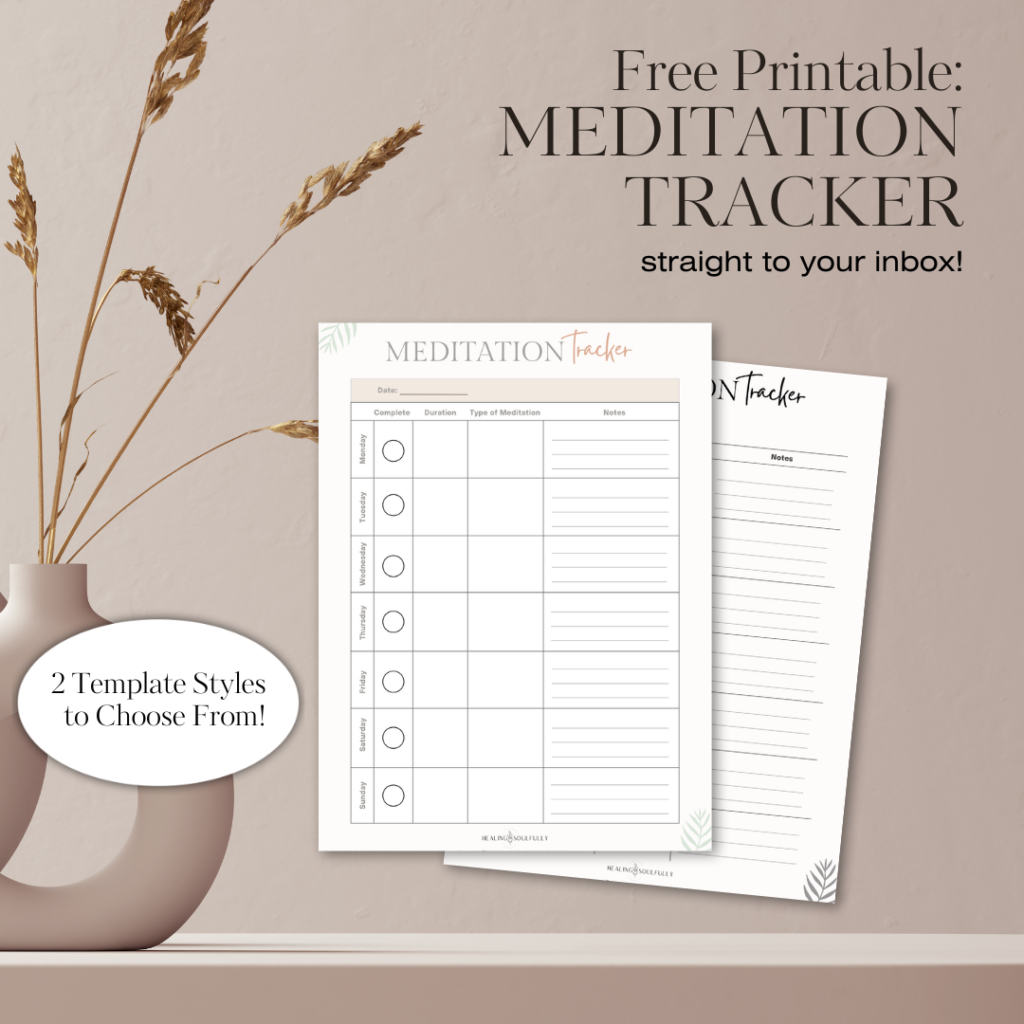
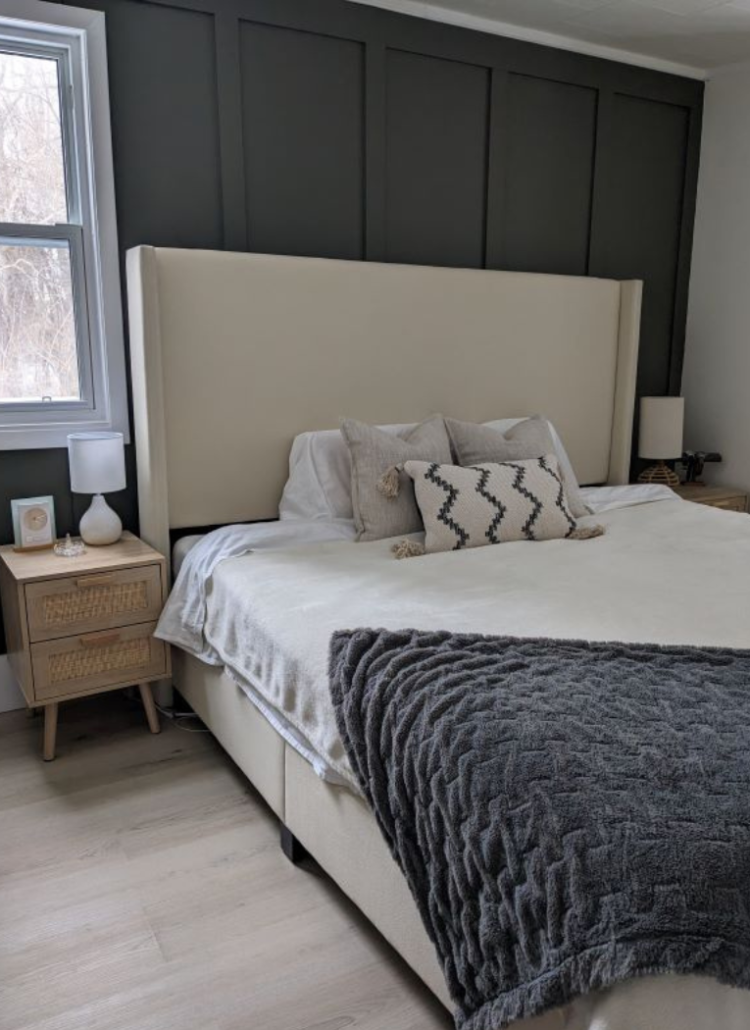



[…] you’re new to meditation here are a few meditation tips for beginners that can get you started on your journey to mindfulness and […]